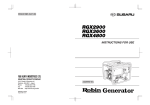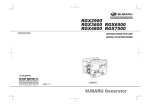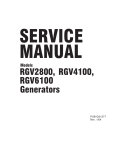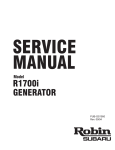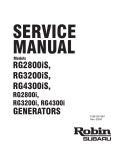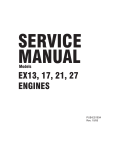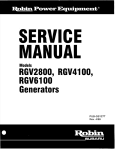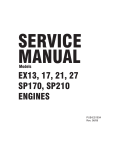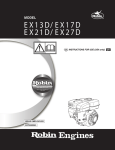Download Robin America RGX2900 Service manual
Transcript
SERVICE MANUAL Models RGX2900 RGX3600 RGX4800 GENERATORS PUB-GS2102 Rev. 05/06 CONTENTS Section Title Page 1. SPECIFICATIONS 1-1 SPECIFICATIONS . . . . . . . . . . . . . . . . . . . . . . . . . . . . . . . . . . . . . . . . . . . . . . . . . . 1 1-2 PERFOMANCE CURVES . . . . . . . . . . . . . . . . . . . . . . . . . . . . . . . . . . . . . . . . . . . . 2 2. GENERAL DESCRIPTION 2-1 EXTERNAL VIEW . . . . . . . . . . . . . . . . . . . . . . . . . . . . . . . . . . . . . . . . . . . . . . . . . . 8 2-2 CONTROL PANEL . . . . . . . . . . . . . . . . . . . . . . . . . . . . . . . . . . . . . . . . . . . . . . . . . 9 2-3 ALTERNATOR . . . . . . . . . . . . . . . . . . . . . . . . . . . . . . . . . . . . . . . . . . . . . . . . . . . . .11 2-4 LOCATION OF SERIAL NUMBER AND PRODUCTION NUMBER . . . . . . . . . . . .12 3. RANGE OF APPLICATIONS . . . . . . . . . . . . . . . . . . . . . . . . . . . . . . . . . . . . . . . . . . . . .13 4. MEASURING AND CHECKING PROCEDURES 4-1 MEASURING INSTRUMENTS . . . . . . . . . . . . . . . . . . . . . . . . . . . . . . . . . . . . . . . .16 4-2 AC OUTPUT MEASURING . . . . . . . . . . . . . . . . . . . . . . . . . . . . . . . . . . . . . . . . . . .19 4-3 DC OUTPUT MEASURING . . . . . . . . . . . . . . . . . . . . . . . . . . . . . . . . . . . . . . . . . . .19 4-4 MEASURING INSULATION RESISTANCE . . . . . . . . . . . . . . . . . . . . . . . . . . . . . . .20 4-5 CHECKING FUNCTIONAL MEMBERS . . . . . . . . . . . . . . . . . . . . . . . . . . . . . . . . .21 5. DISASSEMBLY AND ASSEMBLY 5-1 PREPARATION AND PRECAUTIONS . . . . . . . . . . . . . . . . . . . . . . . . . . . . . . . . . .25 5-2 DISASSEMBLY PROCEDURES . . . . . . . . . . . . . . . . . . . . . . . . . . . . . . . . . . . . . . .26 5-3 REASSEMBLY PROCEDURES . . . . . . . . . . . . . . . . . . . . . . . . . . . . . . . . . . . . . . .34 6. TROUBLE SHOOTING . . . . . . . . . . . . . . . . . . . . . . . . . . . . . . . . . . . . . . . . . . . . . . . . .42 7. WIRING DIAGRAM . . . . . . . . . . . . . . . . . . . . . . . . . . . . . . . . . . . . . . . . . . . . . . . . . . . .45 This manual covers only alternator and control unit portion of the generator. As to the servicing information of engine portion, please refer to the “EX series” service manual. The specifications and information included in this manual were in effect at the time of printing. FUJI HEAVY INDUSTRIES LTD. reserve the right to change the specifications and to make modifications in the course of technical progress, at anytime without notice. No parts of this manual may be reproduced without written permission. 1. SPECIFICATIONS 1-1 SPECIFICATIONS MODEL RGX3600 RGX2900 RGX4800 Brush-less, self-exciting, 2-poles, single phase Type Voltage regulating system Condenser type AC Output 220-50, 240-50, 230-50, 120/240-60 Rated voltage-Frequency V-Hz Generator Rated output Maximum output VA (W) VA (W) 50Hz 2000 2400 3500 60Hz 2400 2900 4100 50Hz 2400 3000 4100 60Hz 2900 3600 4800 Rated power factor 1.0 Safety device type Fuse-less circuit breaker DC Output Rated voltage V 12 Rated current A 8.3 Safety device type Fuse-less circuit breaker 169 mL 211 Engine Fuel L Rated continuous operation H 16.6 50Hz 12 9.5 7 60Hz 10.5 8.4 6 L 1.0 0.6 Spark plug BR-6HS (NGK) (Champion; RL86C) Starting system Dimension 265 Automotive Unleaded Gasoline Fuel tank capacity Engine oil capacity EX27D ROBIN, Air-cooled, 4-stroke, OHC Type Displacement EX21D EX17D Model Recoil starter Length mm 580 605 650 Width mm 420 450 510 Height mm 480 500 540 kg 48 54 70 Dry weight Specifications are subject to change without notice. –1– 1-2 PERFOMANCE CURVES RGX2900 230 3.0 220 210 2.0 52 50 1.0 OUTPUT (kVA) FREQUENCY (Hz) VOLTAGE (V) (50Hz-220, 230V) Maximum output Rated output 2,400 VA 2,000 VA Frequency Rated voltage Rated amperage 50 Hz 220V, 230 V 9.1 A, 8.7 A Maximum output Rated output 2,400 VA 2,000 VA Frequency Rated voltage Rated amperage 50 Hz 240 V 8.3 A 48 0 0 5 10 CURRENT (A) 250 3.0 240 230 2.0 52 50 1.0 48 0 0 5 10 CURRENT (A) –2– OUTPUT (kVA) FREQUENCY (Hz) VOLTAGE (V) (50Hz-240V) RGX2900 250 3.0 240 230 2.0 62 60 1.0 OUTPUT (kVA) FREQUENCY (Hz) VOLTAGE (V) (60Hz-120/240V) ● 60Hz-240V output Maximum output Rated output 2,900 VA 2,400 VA Frequency Rated voltage Rated amperage 60 Hz 240 V 10 A Maximum output Rated output 2,900 VA 2,400 VA Frequency Rated voltage Rated amperage 60 Hz 120 V 20 A 58 0 0 5 10 15 CURRENT (A) 130 3.0 120 110 2.0 62 60 1.0 58 0 0 10 20 CURRENT (A) –3– OUTPUT (kVA) VOLTAGE (V) 60Hz-120V output FREQUENCY (Hz) ● RGX3600 230 3.0 220 210 2.0 52 50 1.0 OUTPUT (kVA) FREQUENCY (Hz) VOLTAGE (V) (50Hz-220, 230V) Maximum output Rated output 3,000 VA 2,400 VA Frequency Rated voltage Rated amperage 50 Hz 220V, 230 V 10.9 A, 10.4 A Maximum output Rated output 3,000 VA 2,400 VA Frequency Rated voltage Rated amperage 50 Hz 240 V 10 A 48 0 0 5 10 15 CURRENT (A) 250 3.0 240 230 2.0 52 50 1.0 48 0 0 5 10 15 CURRENT (A) –4– OUTPUT (kVA) FREQUENCY (Hz) VOLTAGE (V) (50Hz-240V) RGX3600 250 3.0 240 230 2.0 62 60 1.0 OUTPUT (kVA) FREQUENCY (Hz) VOLTAGE (V) (60Hz-120/240V) ● 60Hz-240V output Maximum output Rated output 3,600 VA 2,900 VA Frequency Rated voltage Rated amperage 60 Hz 240 V 12.1 A Maximum output Rated output 3,600 VA 2,900 VA Frequency Rated voltage Rated amperage 60 Hz 120 V 24.2 A 58 0 0 5 10 15 CURRENT (A) 130 3.0 120 110 2.0 62 60 1.0 58 0 0 10 20 30 CURRENT (A) –5– OUTPUT (kVA) VOLTAGE (V) 60Hz-120V output FREQUENCY (Hz) ● RGX4800 5.0 230 4.0 220 210 3.0 52 2.0 50 48 OUTPUT (kVA) FREQUENCY (Hz) VOLTAGE (V) (50Hz-220V,230V) Maximum output Rated output 4,100 VA 3,500 VA Frequency Rated voltage Rated amperage 50 Hz 220V, 230 V 15.9 A, 15.2 A Maximum output Rated output 4,100 VA 3,500 VA Frequency Rated voltage Rated amperage 50 Hz 240 V 14.6 A 1.0 0 0 4 8 12 16 20 CURRENT (A) 5.0 250 4.0 240 230 3.0 52 2.0 50 48 1.0 0 0 4 8 12 16 20 CURRENT (A) –6– OUTPUT (kVA) FREQUENCY (Hz) VOLTAGE (V) (50Hz-240V) RGX4800 5.0 250 4.0 240 230 3.0 62 2.0 60 58 OUTPUT (kVA) FREQUENCY (Hz) VOLTAGE (V) (60Hz-120/240V) ● 60Hz-240V output Maximum output Rated output 4,800 VA 4,100 VA Frequency Rated voltage Rated amperage 60 Hz 240 V 17.1 A Maximum output Rated output 4,800 VA 4,100 VA Frequency Rated voltage Rated amperage 60 Hz 120 V 34.2 A 1.0 0 0 4 8 12 16 20 CURRENT (A) 5.0 130 4.0 120 110 3.0 62 2.0 60 58 1.0 0 0 8 16 24 32 40 CURRENT (A) –7– OUTPUT (kVA) VOLTAGE (V) 60Hz-120V output FREQUENCY (Hz) ● 2. GENERAL DESCRIPTION 2-1 EXTERNAL VIEW Engine switch Fuel tank Fuel strainer (Fuel cock) Control panel Recoil starter handle Recoil starter Oil gauge (oil filler) Oil drain plug Fuel gauge Tank cap Spark plug cap Choke lever Air cleaner Muffler cover Exhaust outlet –8– 2-2 CONTROL PANEL RGX2900 (50Hz-220V, 240V) RGX2900 (60Hz-120/240V) AC receptacle AC receptacle Voltmeter Voltmeter AC circuit breaker DC output terminal DC circuit breaker AC circuit breaker Earth (ground) terminal RGX3600 (50Hz-220V, 240V) DC output terminal DC circuit breaker RGX3600 (60Hz-120/240V) AC receptacle DC output terminal DC circuit breaker AC receptacle Voltmeter Voltmeter AC circuit breaker AC circuit breaker Earth (ground) terminal RGX4800 (50Hz-220V, 240V) DC output terminal DC circuit breaker Earth (ground) terminal RGX4800 (60Hz-120/240V) AC receptacle AC receptacle Voltmeter DC circuit breaker Full power switch Voltmeter AC circuit breaker DC output terminal Earth (ground) terminal AC circuit breaker Earth (ground) terminal DC output terminal –9– DC circuit breaker Earth (ground) terminal RGX2900 (50Hz-230V) AC receptacle Voltmeter AC circuit breaker DC output terminal DC circuit breaker Earth (ground) terminal RGX3600 (50Hz-230V) AC receptacle Voltmeter AC circuit breaker DC output terminal DC circuit breaker Earth (ground) terminal RGX4800 (50Hz-230V) AC receptacle Voltmeter AC circuit breaker DC output terminal DC circuit breaker Earth (ground) terminal – 10 – 2-3 ALTERNATOR RGX2900/3600 Rotor CP Cover bolt Stator CP Ball bearing Crank shaft Rotor bolt Rear cover Mount rubber Stator cover Front cover RGX4800 Ball bearing Cover bolt Rotor CP Stator CP Rotor bolt Mount rubber Rear cover Crank shaft Stator cover – 11 – Front cover 2-4 LOCATION OF SERIAL NUMBER AND PRODUCTION NUMBER Generator serial number and production number are stamped on the label stuck on the side of fuel tank. PROD No. / SER No. (Label) NOTE : When inquiring about your generator or ordering spare parts, always give us the Model, Serial Number and Production Number. – 12 – 3. RANGE OF APPLICATIONS Generally, the power rating of an electrical appliance indicates the amount of work that can be done by it. The electric power required for operating an electrical appliance is not always equal to the output wattage of the appliance. The electrical appliances generally have a label showing their rated voltage, frequency, and power consumption (input wattage). The power consumption of an electrical appliance is the power necessary for using it. When using a generator for operating an electrical appliance, the power factor and starting wattage must be taken into consideration. In order to determine the right size generator, it is necessary to add the total wattage of all appliances to be connected to the unit. Refer to the followings to calculate the power consumption of each appliance or equipment by its type. (1) Incandescent lamp, heater, etc. with a power factor of 1.0 Total power consumption must be equal to or less than the rated output of the generator. Example : A rated 3000W generator can turn thirty 100W incandescent lamps on. (2) Fluorescent lamps, motor driven tools, light electrical appliances, etc. with a smaller power factor Select a generator with a rated output equivalent to 1.2 to 2 times of the power consumption of the load. Generally the starting wattage of motor driven tools and light electrical appliances are 1.2 to 3 times lager than their running wattage. Example : A rated 250 W electric drill requires a 400 W generator to start it. NOTE 1: If a power factor correction capacitor is not applied to the fluorescent lamp, the more power shall be required to drive the lamps. NOTE 2: Nominal wattage of the fluorscent lamp generally indicates the output wattage of the lamp. Therefore, if the fluorescent lamp has no special indication as to the power consumption, efficiency should be taken into account as explained in ltem (5) on the following page. (3) Mercury lamps with a smaller power factor Loads for mercury lamps require 2 to 3 times the indicated wattage during start-up. Example : A 400 W mercury lamp requires 800 W to 1200 W power source to be turned on. A rated 3000 W generator can power two or three 400 W mercury lamps. (4) Initially loaded motor driven appliances such as water pumps, compressors, etc. These appliances require large starting wattage which is 3 to 5 times of running wattage. Example : A rated 900 W compressor requires a 4500 W generator to drive it. NOTE 1: Motor-driven appliances require the aforementioned generator output only at the starting. Once their motors are started, the appliances consume about 1.2 to 2 times their rated power consumption so that the excess power generated by the generator can be used for other electrical appliances. NOTE 2: Motor-driven appliances mentioned in items (3) and (4) vary in their required motor starting power depending on the kind of motor and start-up load. If it is difficult to determine the optimum generator capacity, select a generator with a larger capacity. – 13 – (5) Appliances without any indication as to power consumption Some appliances have no indication as to power consumption; but instead the work load (output) is indicated. In such a case, power consumption is to be worked out according to the numerical formula mentioned below. (Output of electrical appliance) = (Power consumption) (Efficiency) Efficiencies of some electrical appliances are as follows : Single-phase motor . . . . . .0.6 to 0.75 (The smaller the motor, the lower the efficiency) Fluorescent lamp . . . . . . . .0.7 to 0.8 Example 1: A 40W fluorescent lamp means that its luminous output is 40W. Its efficiency is 0.7 and accordingly, power consumption will be 40÷0.7= 57W. As explained in Item (2), multiply this power consumption value of 57W by 1.2 to 2 and you will get the figure of the necessary capacity of a generator. In other words, a generator with a rated output of 1000W capacity can light nine to fourteen 40W fluorescent lamps. Example 2: Generally speaking, a 400W motor means that its work load is 400W. Efficiency of this motor is 0.7 and power consumption will be 400÷0.7= 570W. When this motor is used for a motor-driven tool, the capacity of the generator should be multipled by 1.2 to 3 and 570W as explained in the ltem (3). 570 (W) x 1.2 to 3 = 684 (W) to 1710 (W) Applicable Wattage (approx. W) Applications RGX2900 RGX3600 RGX4800 50Hz 60Hz 50Hz 60Hz 50Hz 60Hz Incandescent lamp, Heater, etc 2000 2400 2400 2900 3500 4100 Fluorescent lamp, Electric tool, etc 1100 1200 1200 1500 1800 2100 Mercury lamp, etc 800 900 900 1100 1300 1500 Pump, Compressor, etc 500 550 550 650 800 950 – 14 – NOTES : Wiring between generator and electrical appliances 1. Allowable current of cable Use a cable with an allowable current that is higher than the rated input current of the load (electrical appliance). If the input current is higher than the allowable current of the cable used, the cable will become excessively heated and deteriorate the insulation, possibly burning it out. The table below shows cables and their allowable currents for your reference. 2. Cable length If a long cable is used, a voltage drop occurs due to the increased resistance in the conductors decreasing the input voltage to the load (electrical product). As a result, the load can be damaged. The table below shows voltage drops per 30 meters of cable. Cross sectional mm2 Allowable Current A Cable Resistance Ω/100m 5A 10A 15A 20A 25A 30A 1.25 12 1.486 4.5V 8.9V * * * * 2.0 17 0.952 2.8V 5.7V 8.6V * * * 3.5 23 0.517 1.6V 3.1V 4.7V 6.2V * * 5.5 35 0.332 1.0V 2.0V 3.0V 4.0V 5.0V 6.0V Voltage drop indicates as V= Voltage drops per 30 meters of cable 1 xRxIxL 100 R : Resistance (Ω/100m) I : Electric current (A) L : Length (m) The length of wire (L) indicates round length, which is the length from the generator to the electrical tools and back. <Example> R : Resistance 1.25mm2 = 1.48 Ω/100m I : Electric current 10A L : Length 30m The voltage drop of the case described above is V = 1.48Ω x 10A x (30m x 2) ≒ 8.9 (V) 100 – 15 – 4. MEASURING AND CHECKING PROCEDURES 4-1 MEASURING INSTRUMENTS (1) VOLTMETER AC voltmeter is necessary. The approximate AC voltage ranges of the voltmeters to be used for various types of generators are as follows : 0 to 150 V : Type with an output voltage of 110 or 120 V 0 to 300 V : Type with an output voltage of 220, 230 or 240 V 0 to 150 V, 0 to 330 V : Dual voltage type For AC For DC (2) AMMETER AC ammeter is necessary. An AC ammeter with a range that can be changed according to the current rating of a given generator is most desirable. (About 10 A, 20 A, 100 A) For AC (3) FREQUENCY METER Frequency range : To cover 45 to 65Hz NOTE : Be careful of the frequency meter's input voltage range. – 16 – For DC (4) CIRCUIT TESTER For measuring resistance, etc. NOTE : The ordinary circuit tester may cause erroneous readings due to their measuring method. Use a high-grade, precise circuit tester to check the generator components. (5) MEAGER TESTER Used for measuring generator insulation resistance. Select the one with testing voltage range of 500V. (6) TACHOMETER Use the contactless type tacho meter for checking engine speed. – 17 – (7) "Dr.Robin" GENERATOR TESTER The "Dr.Robin" generator tester is exclusively designed for fast, easy diagnosis and repair of Robin generators. The "Dr.Robin" has the following features : 1) Functions of voltmeter, frequency meter, megger tester, capacitance meter and circuit tester are combined in one unit. 2) Fast and easy readout by digital indicator. 3) Built-in automatic battery checker indicates the time to change batteries. 4) Tester and accessories are installed in a handy, sturdy case for easy carrying. ● SPECIFICATIONS MODEL Dr.Robin 388-47565-08 Part Number Voltage Measuring Range 0 to 500 V AC Frequency 25 to 70 Hz Resistance 0.1 to 1,999 Ω Condenser Capacity 10 to 100μF Insulation Resistance 3MΩ Circuit Protector Fuse Power Source 2 x 6F44P (006P) Dry Cell Battery Test leads with needle probes ... 1 set Test leads with jack plugs ... 1 set Accessories Dimensions (L x W x H) 285 mm x 200 mm x 110 mm Weight 1.6 kg The "Dr.Robin" generator tester can be ordered from Robin generator distributors by the following part number. Dr.Robin_Part_Number_:_388-47565-08 If you do not have a "Dr.Robin" generator tester, use the instruments described in the following section for checking generator parts. – 18 – 4-2 AC OUTPUT MEASURING SWITCH LOAD A ~ V ~ F TO AC RECEPTACLE Use a circuit above for measuring AC output. A hot plate or lamp with a power factor of 1.0 may be used as a load. Adjust the load and rpm, and check that the voltage range is as specified in the following table at the rated amperage and rated rpm. Specification 50Hz-220V,230V 50Hz-240V 60Hz-120/240V 207-238 226-259 226-259 113-130 RGX2900 RGX3600 RGX4800 Voltage range Model 4-3 DC OUTPUT MEASURING SW Load To DC Terminal Measurement of DC output is executed with the switch turned ON while the current is regulated at 8.3A by adjusting the load to the generator. If the voltage is within the range from 6V to 14V, the voltage output is normal. NOTE : If a battery is connected as a load to the generator, the DC output voltage will increase by approximately 1 to 2 V. Therefore, carefully observe the electrolyte level and do not overcharge the battery. – 19 – 4-4 MEASURING INSULATION RESISTANCE Use a “Dr. Robin” generator tester in megger tester mode or use a megger tester to check the insulation resistance. Connect a megger tester to one of receptacle output terminals and the ground terminal, then measure the insulation resistance. An insulation resistance of 1 megohm or more is normal. (The original insulation resistance at the time of shipment from the factory is 10 megohm or more.) If it is less than 1 megohm, disassemble the generator and measure the insulation resistance of the stator, rotor and control panel individually. Any part where the insulation resistance is less than 1M Ω has faulty insulation, and may cause electric leakage and electric shock. Replace the faulty part. ● STATOR Measure insulation resistance between each terminal from the stator and the stator core. Measured insulation resistance of 1M ohm or more is normal. If it is less than 1M ohm, leakage current and electric shock might occur due to faulty insulation. Replace with new one. ● CONTROL PANEL With AC circuit breaker turned on, measure insulation resistance between each portion of electrical parts and earth (grounding) terminal or control panel itself. Measured insulation resistance of 1M ohm or more is normal. If it is less than 1M ohm, leakage current and electric shock might occur due to faulty insulation. Replace with new one. – 20 – 4-5 CHECKING FUNCTIONAL MEMBERS (1) STATOR Disengage connectors on the wires from stator and check the resistance between the wires using a circuit tester referring to the table below. Coil resistance (Ω) Coils (Wire color) AC coil 1 (Black - Blue) AC coil 2 (Red - White) Condenser coil (Yellow - Yellow) DC coil (Brown - Brown) RGX2900 50Hz-220V 50Hz-230V RGX3600 RGX4800 50Hz-220V 50Hz-220V 50Hz-240V 60Hz-120/240V 50Hz-230V 50Hz-240V 60Hz-120/240V 50Hz-230V 50Hz-240V 60Hz-120/240V 0.8 0.9 0.6 0.6 0.7 0.4 0.4 0.4 0.3 0.8 0.9 0.6 0.6 0.7 0.4 0.4 0.4 0.3 2.2 2.2 1.7 1.3 1.3 1.0 0.9 0.9 0.6 0.3 0.3 0.2 0.2 0.2 0.2 0.2 0.2 0.1 NOTE : If the circuit tester is not sufficiently accurate, it may not show the values given and may give erroneous readings. Erroneous readings will also occur when there is a wide variation of resistance among coil windings or when measurement is performed at ambient temperature different from 20° C (68° F). (2) ROTOR Measure resistance between the field coil. Coil resistance (Ω) Field coil RGX2900 RGX3600 RGX4800 1.8 1.6 1.6 NOTE1 : When measuring the field coil resistance, be sure to disconnect the soldering connection and take out diode rectifier and surge absorber. NOTE2 : When measuring, tolerance should be considered because of the tester inaccuracy, winding number variation, ambient temperature etc. – 21 – The diode rectifier and surge absorber are located as RGX2900/3600 shown in the following illustrations. SURGE ABSORBER RGX4800 SURGE ABSORBER (3) SURGE ABSORBER Measure the surge absorber resistance. Resistance (Ω) ∞Ω – 22 – DIODE RECTIFIER DIODE RECTIFIER (4)AC CIRCUIT BREAKER Check continuity between each of two terminals at the rear of the AC circuit breaker while it is mounted on the control panel. RGX2900 RGX3600/4800 A A B B AC circuit breaker OFF:No continuity ON :Continuity (5) DC CIRCUIT BREAKER Make sure that there is continuity between the two terminals of DC circuit breaker when its push button is pressed. – 23 – (6) CONDENSER Use "Dr. ROBIN" in capacitance mode to check the capacity of condenser. NOTE: Be sure to discharge by shorting condenser leads each other before checking the capacitance, or the accurate reading cannot be obtained. If such instrument is unavailable, the condenser can be checked by replacing with new one. If the generator performs good with new condenser, the cause of trouble is defect in original condenser. MODEL RGX2900 RGX3600 RGX4800 CAPACITY(μF) 24 37 20 and 30 (8) AC RECEPTACLES Make sure that no live part wire or plastic part is burnt out. (9) FLOAT TYPE OIL SENSOR Check the oil sensor when it is installed on the engine. Check that sufficient engine oil is filled in the crankcase. Check that there is continuity between the lead wire of oil sensor and the ground (engine crankcase) when the oil level is above the minimum level mark of oil gauge. Check that there is no continuity as above when the oil level is below the minimum level mark of oil gauge. – 24 – Oil sensor 5. DISASSEMBLY AND ASSEMBLY 5-1 PREPARATION AND PRECAUTIONS (1) Be sure to memorize the location of individual parts when disassembling the generator so that the generator can be reassembled correctly. Tag the disassembled part with the necessary information to facilitate easier and smoother reassembly. (2) For more convenience, divide the parts into several groups and store them in boxes. (3) To prevent bolts and nuts from being misplaced or installed incorrectly, replace them temporarily to their original position. (4) Handle disassembled parts with care; clean them before reassembly using a neutral cleaning fluid. (5) Remove the battery before disassembling the generator. (Electric start models) (6) Use all disassembly/assembly tools properly, and use the proper tool for each specific job. (7) Be sure to attach the foam rubber linings inside the covers on their original position when reassembling the generator. When deformation or damage or falling-off of foam rubber lining is found, replace it with new part. Failure to do so will result in poor performance and durability of the generator. (8) Bind the wires and fuel pipes using wire bands as they have been done in original configuration. NOTE : As to detailed information for servicing procedures on engine portion, please refer to Robin engine service manual for "EX series". NOTE : Illustrations adopted for the following procedures are ones for RGX4800 model. Also illustrations for RGX2900/3600 are adopted as necessary. – 25 – 5-2 DISASSEMBLY PROCEDURES 5-2-1 Fuel Draining (1) Make sure fuel strainer cock is closed. Disconnect fuel pipe from carburetor. Turn fuel cock lever to the OPEN position, and the drain fuel from fuel tank. Tool : Pliers (2) Remove drain screw from carburetor, and drain fuel from carburetor. After draining, install drain screw in position. Tool : Socket wrench (8 mm) Drain screw (3) Remove strainer and drain fuel from strainer cap. After draining, install strainer in position. – 26 – 5-2-2 Fuel Tank Cussion rubber Remove bolts and take out fuek tank. Fastener : M6 -12 mm Flange reamer bolts (2 pcs) Tool : Box wrench (10 mm) CAUTION : Before removing fuel tank, make sure to drain fuel from fuel tank and pipings. NOTE : Don't forget to keep rubbers (2 pcs) commonly fixed with bolts. Control panel side Fuel tank Frange reamer bolt Cussion rubber Rubber – 27 – 5-2-3 Electric Connectors Remove bushing from control panel on back side, pull out wiring harness connectors, and then disconnect electric wirings. Disconnect electric wirings from engine switch terminals. 5-2-4 Control Panel Remove screws and take out control panel from frame. Fastener : M6 - 12 mm Screws (4 pcs) Tool : Box wrench (10 mm) 5-2-5 Muffler (1) Remove screws and take out cover from engine. Fastener : M6 - 12 mm Flange bolts (3 pcs) Tool : Box wrench (10 mm) – 28 – (2) Remove nuts and take out exhaust pipe. Fastener : M8 Flange nuts (2 pcs) Tool : Box wrench (12 mm) (3) Remove muffler and cover. Fastener : M8 - 10 mm Flange bolts (6 pcs) Tool : Box wrench (12 mm) (4) Remove muffler bracket commonly fixed with alternator. Fastener : M8 - 20 mm Bolt & washers (2 pcs-RGX 4800) M8 Flange nuts (2 pcs) M8 - 20 mm Bolt & washers (4 pcs-RGX 2900/3600) Tool : Socket wrench (12 mm) RGX2900/3600 Frange nut Bolt and washer AY Muffler bracket B Bolt and washer AY Muffler bracket A – 29 – 5-2-6 Rear Cover Arms and Grounding Terminal Remove nuts fixing rear cover onto mounting rubbers. Fastener : M8 Flange nuts (2 pcs) Tool : Box wrench (12 mm) Grounding Terminal 5-2-7 Stator Cover Take out stator cover with crows (2 pcs) raised up by using screw driver. Tool : Screwdriver 5-2-8 Bushing Take out bushing from rear cover, pinching with hand. – 30 – 5-2-9 Rear Cover (1) Remove stator bolts (RGX4800) or cover bolts (RGX2900/3600). Fastener : M6 - 150 mm Stator bolts (4 pcs - RGX4800) M6 -130 mm Cover bolts (3 pcs - RGX3600) M6 -110 mm Cover bolts (3 pcs - RGX2900) Tool : Box wrench (12 mm) NOTE: For easy operation, set wooden pieces under the alternator. (2) Take off rear cover from stator, by lightly hitting at boss portions with plastic hammer. Tool : Plastic hammer 5-2-10 Wire CP Remove screw and disconnect wire CP from inside rear cover. Wire CP Fastener : M4 -6 mm Screw Tool : Philips (cross-head) screwdriver Screw – 31 – 5-2-11 Stator Take out stator, holding with hands. 5-2-12 Through Bolts Remove through bolt, by tapping the wrench with plastic hammer. Fastener : M10x1.5 - 240 mm Through bolt (RGX4800) M8x1.25 - 260 mm Through bolt (RGX3600) M8x1.25 - 240 mm Through bolt (RGX2900) Tool : Box-end wrench (14 mm) and Plastic hammer 5-2-13 Rotor (1) Set the engine in the condition of recoil starter side downward. – 32 – (2) Use engine oil and the bolt with seal tape as a tool for pulling out rotor as follows; a. Pour engine oil into the center (through bolt) hole of rotor shaft. b. prepare a bolt with the following thread size; Model Bolt RGX4800 M12×1.5 RGX2900 RGX3600 M10×1.5 Seal tape c. Apply a few turns of seal tape around the tip of the bolt. d. Screw the bolt into the thread of the rotor shaft. e. Torque up the bolt by using socket wrench until rotor comes off loose. NOTE: The hydraulic pressure inside the rotor shaft takes apart the rotor from the engine PTO shaft. f. Wipe off engine oil thoroughly from rotor, rotor shaft, engine PTO shaft and front cover. 5-2-14 Front Cover Remove bolts and washers and take out front cover. Fastener : M8 - 20 mm Bolt & washers (4 pcs) Tool : Box-end wrench (12 mm) – 33 – 5-3 REASSEMBLY PROCEDURES 5-3-1 Front Cover Install front cover onto main bearing cover of the engine in position. Fastener : M8 - 20 mm (4 pcs) Bolt with spring washer & washer Tightening torque : 11.8-13.7 N・m (120-140 kgf・cm) (8.7-10.1 ft・lbs) 5-3-2 Rotor Install rotor onto crankshaft. Fastener : M8x1.25 - 240 mm Through bolt with washer (RGX2900) M8x1.25 - 260 mm Through bolt with washer (RGX3600) M10x1.5 - 240 mm Through bolt with washer (RGX4800) RGX2900/3600 Tightening torque : 11.3-13.2 N・m (115-135 kgf・cm) (8.3-9.7 ft・lbs) RGX4800 Tightening torque : 22.5-24.5 N・m (230-250 kgf・cm) (16.6-18.1ft・lbs) NOTE: Before installing, clean and wipe off oil and foreign materials from taper portion of crankshaft. – 34 – 5-3-3 Stator Install stator into front cover. Adjust the stator grove position (4 places) so that stator bolt can be tightened later. (RGX4800) (Stator bolt) Stator bolt fixed hole(4 places) Grove (4 places) Roter Stator Front cover 5-3-4 Wire CP Fix wire CP at inside of rear cover in position. Wire CP Fastener : M4 -6 mm Screw Tool : Philips (cross-head) screwdriver Screw – 35 – 5-3-5 Rear Cover (1) Install rear cover over stator, lightly hitting at the center portion of rear cover with plastic hammer. Tool : Plastic hammer (2) Tighten stator bolts (RGX4800) or cover bolts (RGX2900/3600). Fastener : M6 - 150 mm Stator bolts (4 pcs - RGX4800) M6 - 130 mm Cover bolts (3 pcs - RGX3600) M6 - 110 mm Cover bolts (3 pcs - RGX2900) Tool : Box wrench (12 mm) RGX2900/3600 Tightening torque : 4.5-5.9 N・m (50-60 kgf・cm) (3.6-4.3 ft・lbs) RGX4800 Tightening torque : 11.8-13.7 N・m (120-140 kgf・cm) (8.7-10.1 ft・lbs) 5-3-6 Bushing Insert wirings into bushing, and push bush (big grove side) into rear cover hole. – 36 – 5-3-7 Stator Cover Set stator cover with the crow inserted into slit and bent (2 pcs). Tool : Screwdriver 5-3-8 Rear Cover Arm and Grounding Terminal Fix rear cover arms with mount rubbers, along with grounding terminal. Fastener : M8 Flange nuts (2 pcs) Tool : Box wrench (12 mm) Tightening torque : 11.8-13.7 N・m (120-140 kgf・cm) (8.7-10.1 ft・lbs) Grounding Terminal – 37 – 5-3-9 Muffler (1) Install muffler bracket. Fastener : M8 - 20 mm Bolt & washers (2 pcs - RGX4800) M8 Flange nuts (2 pcs) M8 - 20 mm Bolt & washers (4 pcs - RGX2900/3600) Tool : Socket wrench (12 mm) Tightening torque : 11.8-13.7 N・m (120-140 kgf・cm) (8.7-10.1 ft・lbs) (2) Install muffler and cover. Fastener : M8 - 10 mm Flange bolts (6 pcs) Tool : Box wrench (12 mm) Tightening torque : 11.8-13.7 N・m (120-140 kgf・cm) (8.7-10.1 ft・lbs) (3) Install exhaust pipe. Fastener : M8 Flange nuts (2 pcs) Tool : Box wrench (12 mm) Tightening torque : 11.8-13.7 N・m (120-140 kgf・cm) (8.7-10.1 ft・lbs) – 38 – (4) Attach exhaust pipe cover. Fastener : M6 - 12 mm Flange bolts (3 pcs) Tool : Box wrench (10 mm) Tightening torque : 4.5-5.9 N・m (50-60 kgf・cm) (3.6-4.3 ft・lbs) 5-3-10 Control Panel Fix control panel into frame. Fastener : M6 - 12 mm Screws (4 pcs) Tool : Box wrench (10 mm) Tightening torque : 4.5-5.9 N・m (50-60 kgf・cm) (3.6-4.3 ft・lbs) 5-3-11 Electric Connectors (1) Connect all wirings of the same appearance each other between control panel and alternator. – 39 – (2) Push into bushing into the hole on the back side of control panel. Also connect electric wirings with engine switch terminals. Either wiring can be connected with terminal. 5-3-12 Fuel Tank Cussion rubber (1) Set fuel tank with cushion rubber sliding into stay (2 places). Stay (2) Fix with bolts. Fastener : M6 -12 mm Flange reamer bolts (2 pcs) Tool : Box wrench (10 mm) Tightening torque : 4.5-5.9 N・m (50-60 kgf・cm) (3.6-4.3 ft・lbs) Control panel side – 40 – 5-3-13 Fuel piping Connect fuel pipe to carburetor with clam. Fuel pipe Tool : Pliers Clamp Carburetor – 41 – 6. TROUBLE SHOOTING Check if engine speed is normal. 50Hz : 3,000rpm 60Hz : 3,600rpm NG Refer to "Engine dose not start (Start failure )" OK Check if stator coil is normal. Main coil NG Replace OK Check if rotor coil is normal. NG Replace OK Check if condenser coil is normal. NG Replace OK Check if wiring is break or improper connection. Replace when wiring is break or damage. NG Connect properly. – 42 – No DC current Check if DC coil of stator is normal. NG Replace OK Check if diode rectifier is normal. NG Replace OK Check if DC circuit breaker is normal. NG Replace OK Check if wiring is break or improper connection. NG Replace when wiring is break or damage. Connect properly. – 43 – Engine does not start (Start failure) None Check the gasoline in the tank Add gasoline Yes None Check the oil volume Add oil (up to the rated volume) Yes Confirm of the oil SW E/g GND Resistance value≒0 Ω Change the Oil sensor unit Tester Fuel cock is in the ON position NO Open the cock NO Clean, change the filter Yes Gasoline leaks when the carburetor drain is loosened Yes Check for gasoline corrosion Corrosion Change gasoline OK Remove the spark plug and check the electrode Dry Blockage of the fuel tube carburetor, such as noise, etc. No spark ・Check for dirty plugs, or gap ・Check the connection (coupler, high tension cord) Wet Attach the plug to the plug cap, and check for sparks by grounding the electrode Sparks Check the valve clearance of the compressed pressure (compression) NG Adjustment – 44 – 7. WIRING DIAGRAM (60Hz-120V) RGX2900 [U.S.A. model] ENGINE CONTROL BOX Oil sensor Wi ring color code Blk : Black Blk/W : Black/White Blu : Blue LBlu : Light blue Brn : Brown Brn/W : Brown/White Grn : Green Grn/W : Green/White Org : Orange Gry : Gray R : Red W : White Y : Yellow W/Blk : White/Black Grn/Y : Green/Yellow Pur : Purple Engine switch Blk Ignition coil Grn Spark plug GENERATOR AC circuit breaker AC Winding 1 Grn R Blk Earth (Ground) terminal Gry Pilot lamp PL Blu R AC Winding 2 Field Winding Rotor H Hour Hr meter W Rec W Condenser Winding Diode stack Assy Org DC Winding Brn Circuit breaker DC output terminal Brn/W Brn Y Condenser Y Grn (60Hz-120/240V) RGX3600 [U.S.A. model] ENGINE CONTROL BOX Oil sensor Engine switch Blk Charge coil Ignition coil Spark plug Grn Blu LBlu W W Solenoid GENERATOR 1 5 AC Winding 1 AC circuit breaker AC Winding 2 Field Winding Rotor 3 2 Idle control switch DC Winding Condenser Winding Blk Pilot PL lamp Blu R Hour Hr meter Idle control unit Full power switch 1 2 3 5 4 6 8 7 9 H X W W Y Diode stack Assy Org Y X Circuit breaker DC output terminal Brn/W Brn Y G W Rec3 W Brn Gry Rec2 G Rec1 G Condenser Grn – 45 – Earth (Ground) terminal (60Hz-120/240V) RGX4800 [U.S.A. model] ENGINE CONTROL BOX Wi ring color code Oil sensor Blk : Black Blk/W : Black/White Blu : Blue LBlu : Light blue Brn : Brown Brn/W : Brown/White Grn : Green Grn/W : Green/White Org : Orange Gry : Gray R : Red W : White Y : Yellow W/Blk : White/Black Grn/Y : Green/Yellow Pur : Purple Engine switch Blk Charge coil Spark plug Grn Blu LBlu 3 2 Idle control switch W W Solenoid GENERATOR AC circuit breaker Full power switch 1 2 3 AC Winding 1 Blk Pilot PL lamp Blu R AC Winding 2 Field Winding Rotor Idle control unit 1 5 Hour Hr meter 5 4 6 8 7 9 H W X Diode stack Assy Org DC Winding Brn W Y G X Circuit breaker DC output terminal Brn/W Brn Y Condenser Y Earth (Ground) terminal W Rec3 W Condenser Winding Gr y Rec2 G Rec1 G Circuit breaker Ignition coil Condenser Grn (60Hz-120/240V) RGX4800 w / Starter motor [U.S.A. model] ENGINE CONTROL BOX Battery Fuse Oil sensor Org Magnetiec switch Blk Diode stack Assy Charge coil Ignition coil Spark plug Blu LBlu W W GENERATOR AC Winding 1 AC Winding 2 Field Winding 1 5 DC Winding Blk Pilot PL lamp Blu R W Brn Hour Hr meter 3 2 Idle control switch AC circuit breaker Condenser Winding B ST -M +M IG R Grn Solenoid Rotor Key switch Y Grn Full power switch 1 2 3 5 8 H W 7 9 Gry Rec2 G Rec1 G 4 6 X Y Earth (Ground) terminal W G X W Rec3 Diode stack Assy Org Circuit breaker Brn/W Brn Y Idle control unit Circuit breaker + Electric starter - Condenser DC output terminal Condenser Grn – 46 – 940 Lively Blvd. • Wood Dale, IL 60191 • Phone: 630-350-8200 • Fax: 630-350-8212 e-mail: [email protected] • www.robinamerica.com © Copyright 2006 Robin America, Inc. PRINTED IN THE USA


















































